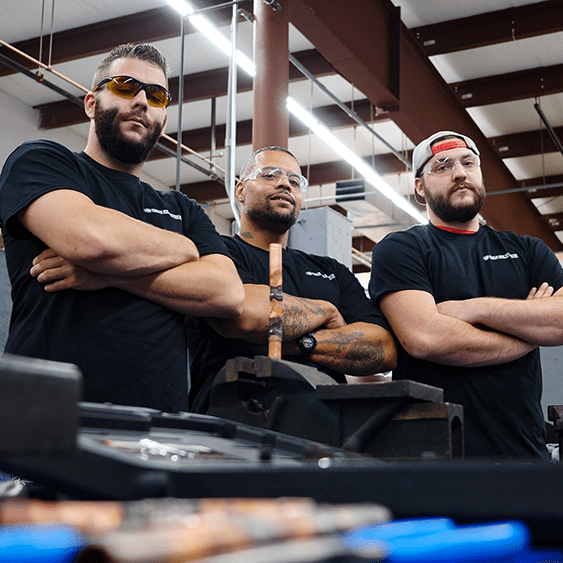The future of skilled trades continues to evolve and grow, with automation and technology trends providing opportunities for those interested in careers in the skilled trades.
Welding Technology Advances, But Skilled Welders Are Still In Demand
Automation is an increasingly popular part of the welding industry, encompassing other tech developments including welding robots, augmented reality (AR), and welder assistive technologies [1]. However, there are still a variety of types of welding being used across industries.”Many processes are still in high demand (SMAW, GTAW, GMAW) these manual processes are still being used in manufacturing, the piping and structural industries. Automated welders are high cost and are not easily mobile,” said Paul Schaefer, Campus President at Midwest Technical Institute’s (MTI) East Peoria campus.Recruitment of skilled welders continues due to demand for both manual welding processes and welding automation technology. Students who enroll in training, like the training offered through MTI welding programs, will learn the skills required for entry-level employment in the welding field.
The welding industry and schools are working together to offer students the skills needed to meet the demands of new technologies. The Bureau of Labor Statistics (BLS) [2] notes that “job prospects should be good for welders trained in the latest technologies.” Pipefitters are in demand as well with the BLS predicting a job outlook growth of 14% [3] between 2018-2028
Although highly automated, laser welding still requires a skilled welder on site. Laser welding is part of the emerging green industry, including wind turbine towers [4] and welding may be useful credential [5] in green industries. The automotive industry [6] is another area where laser MIG welding is becoming the preferred method of welding.
There are often hybrid systems that combine newer laser technology with the reliable and popular MIG type of welding [6]. Schaefer points out, “Welding schools (like MTI) continue to work with professionals in the industry to assure [graduates] are meeting the expectations of the employers and providing the education needed to obtain employment in their field of study.”
Higher Standards For Drivers And Fulfilling Ecommerce Orders Are Growth Trends In Trucking
The trucking industry is in an integral part of the U.S. economy, with more than 71% [7] of freight tonnage being moved around the country on trucks. The rise of ecommerce and online retail has led to an increase in demand for truckers, despite a truck driver shortage. Incentives, as a tool to increase recruitment, is a trend in trucking right now, especially from companies like Walmart [8]. According to Bobby Merckling, Director of CDL Operations and Training at MTI and Delta Technical College (DTC), incentives range from salary increases to added benefits that could decrease the amount of time truckers need to be on the road. For example, Walmart [9] offered drivers three weeks of paid time off in their first year and quarterly bonuses for safe driving.Other incentives will include paid time off and more days at home, but, Merckling notes, the rise of technology in trucking is really what will change trucker drivers’ daily lives for the better.
“Technology leads the way with incentives to make workers in the transportation industry be able to complete their duties in more efficient ways. The more efficient we can make it for the drivers, the more earning potential there may be.”
Technology is also positively impacting truck driving equipment, which Merckling says is better than ever and will likely appeal to younger drivers. There will still be a place for older drivers who have experience and high-quality skills. New FMCSA guidelines will apply stricter mandatory theory and behind-the-wheel training for entry-level drivers. The truck driving programs and courses at MTI will be following the new guidelines.* “We should see higher quality drivers coming out of CDL schools and we could not be more excited about that” said Merckling.
Interested in Learning More About MTI?
Fill out the form below to receive info about our career training programs.
Smart And Green Technologies Are Major Trends In HVAC/R-MAR
HVAC/R-MAR is a fast growing field, with the BLS predicting a much faster than average career growth of 13% through 2028, much faster than the national average for all occupations at 5% [11]. This growth in the HVAC field comes at the same time that smart and green technologies are changing the industry and offering new opportunities for HVAC technicians.”The future of the HVAC industry is very different than it was only a few years ago with all of the new technologies and changes. The one constant for someone wanting to enter this field is that continually educating themselves is always going to be necessary. As much as things stay the same, they also change. We, as technicians, have to be willing to change with them, and that means keeping ourselves educated on this ever changing field,” said Mark Stoltzenburg, HVAC/R-MAR Program Director and Instructor at MTI.Among the newest technology trending is the use of smart thermostats [12]. “Smart technology is changing the HVAC industry in a few ways, but I think the biggest change is to the homeowner themselves. These types of technologies, like the smart wireless/WiFi capable thermostats are giving the homeowner more control over their entire house, as well as their HVAC units,” said Stolzenburg.
These new technologies require that technicians are trained on many different kinds of smart technologies that are becoming increasingly common in the HVAC field. Switching homeowners [13] from old systems to new and maintaining those new systems once the upgrade is complete will be the responsibility of HVAC technicians.
The Environmental and Energy Study Institute (EESI) [14] includes HVAC among growing careers in the renewable energy and energy efficiency sectors, with the appliance industry being the largest employer in energy efficiency. HVAC going green [15] is a major trend, and it’s already taking place in certain areas of the HVAC industry.
According to Stolzenburg, “Many places that deal in refrigeration of small appliances, like Pepsi and Coke, have already made the switch from older refrigerants back to a more natural type.”
The hands-on training offered through MTI’s HVAC/R-MAR Technician Program prepares students for a career in the HVAC industry, and includes training in emerging technologies, such as smart and green technology.
Is a career in the skilled trades right for you?
As new technology continues to be introduced, the skilled trades remain in demand. The future of the skilled trades requires skilled tradesmen and women who will be equipped to tackle the latest trends in the industry.To learn more about MTI’s hands-on training programs, fill out the form below.
Sources
-
[1] https://weldingvalue.com/2019/01/welding-trends-2019/
[2] https://www.bls.gov/ooh/production/welders-cutters-solderers-and-brazers.htm#tab-6
[3] https://www.bls.gov/ooh/construction-and-extraction/plumbers-pipefitters-and-steamfitters.htm#tab-1
[4] https://www.businesswire.com/news/home/20161012005034/en/Top-3-Emerging-Trends-Global-Welding-Safety
[5] https://www.bls.gov/green/construction/
[6] https://weldinginsider.com/6-welding-industries/
[7] https://www.trucking.org/News_and_Information_Reports.aspx
[9] https://www.businessinsider.com/walmart-truck-driver-shortage-hiring-2018-12
[10] https://www.fmcsa.dot.gov/commercial-drivers-license/eldt/faq-driver
[12] https://www.businessinsider.com/best-thermostat
[15] http://www.go-greenhvac.net/



